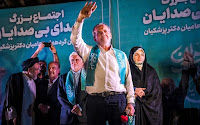The consensus was reached during a bilateral meeting
at the Prime Minister House in Islamabad and later emphasized at a joint press
conference by Prime Minister Shehbaz Sharif and Iranian President Masoud
Pezeshkian.
“The development of economic and trade ties will be achieved
through peace, stability, and tranquility,” Pezeshkian said, underscoring that
terrorism remains a key obstacle to mutual prosperity.
“Given the threats from terrorist groups in border areas,
both sides emphasized the need to increase cooperation to ensure border
security and safeguard the peace and well-being of citizens in border cities,”
the Iranian president added.
The nearly 900-kilometre border between the two countries
has long faced security threats from proscribed groups, such as Jaish al-Adl
and the Baluchistan Liberation Army. Persistent issues, including terrorism,
smuggling, and mutual accusations of harbouring militants, have periodically
strained ties.
Shehbaz acknowledged that security was paramount for
progress in bilateral relations. “There will be zero tolerance for all forms of
terrorism. If anyone falls victim to terrorism in Iran, it is the same as
someone being affected by terrorism in Pakistan,” he said.
“For peace and development in our region, and along our
hundreds of kilometres-long shared border, we must cooperate against terrorism
and take effective steps to eliminate the scourge of terrorism once and for
all,” Shehbaz added.
While the two leaders voiced their commitment to deepening cooperation,
specific operational details were reportedly discussed in President
Pezeshkian’s meeting with Chief of Army Staff Field Marshal Asim Munir.
Later in the evening, Pezeshkian met senior Pakistani
military leaders, including Chairman Joint Chiefs of Staff Gen Sahir Shamshad
Mirza, Air Chief Marshal Zaheer Babar Sidhu, and ISI chief Lt Gen Asim Malik at
the presidency before the dinner reception hosted by President Asif Ali
Zardari. A naval representative was also in attendance.
The two sides reaffirmed their commitment to raising annual
bilateral trade to US$10 billion — a target first set during the late
Iranian president Ebrahim Raisi’s visit to Pakistan in April 2024.
“We can easily, in a short time, increase the volume of
trade from the current US$3 billion to the projected goal of US$10 billion,” Pezeshkian
said during the joint media conference.
Shehbaz echoed the sentiment. “We also jointly hope that the
US$10 billion trade target is achieved at the earliest,” he said.
Trade
has been constrained by a range of factors, including international sanctions
on Iran, security concerns along the border, inadequate infrastructure, and
limited economic complementarity.
Diplomatic and political fluctuations, often shaped by
broader geopolitical tensions, have also affected the implementation of trade
agreements.
While neither leader offered a clear roadmap to resolve
these issues, both underscored a shared political will to continue engaging on
them.
“Our delegations will take these discussions forward very
soon,” Shehbaz said.
Earlier, at the bilateral talks, he had emphasized the need
to convene the long-delayed 22nd meeting of the Pakistan-Iran Joint Economic
Commission at the earliest. The 21st meeting of the Commission was held in
2022.
Proposals
discussed during the talks included facilitating barter trade, increasing
export quotas for rice, fruits, and meat, operationalizing cross-border
markets, and removing trade barriers.
Border market development remains a key focus. Although the
two countries agreed several years ago to establish six such markets, only
three have become operational so far.
“The development of transit routes – railway routes and sea
routes – the expansion and equipping of border markets, the facilitation of
trade, and the establishment of joint free economic zones are critical needs in
the relationship between the two countries, and we had constructive discussions
on these issues,” Pezeshkian said.
Pakistan and Iran signed and exchanged 12 agreements and
memorandums of understanding (MoUs) to enhance cooperation across a broad
spectrum of areas. The documents covered trade, transit, science and
technology, tourism, agriculture, cultural exchange, maritime safety, and
judicial cooperation.
The agreements include collaboration on plant quarantine,
joint use of the Mirjaveh-Taftan border crossing, ICT, tourism cooperation for
2025-27, and a joint ministerial statement on finalising a Free Trade
Agreement.
“We reached agreements in political, economic, commercial,
and cultural fields, and signed documents to facilitate and promote cooperation
in commerce, culture, tourism, transportation, and scientific and educational
exchanges,” Pezeshkian said.













